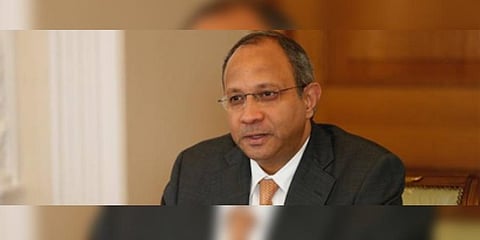

BENGALURU: Social cohesion and co-existence are the only ways India -- a multi-cultural, multi-faith and multi-linguistic society -- can grow as a nation. In response to the international backlash and protests in the country against remarks on Prophet Mohammed by former BJP spokesperson Nupur Sharma and Delhi media head Naveen Jindal, former deputy national security adviser Pankaj Saran told The New Indian Express that more than the reactions of Islamic countries against the remarks, which were ‘episodic’, the larger and long-term issue is of “social cohesion in India and is of concern”.
“There are more than 20 crore Muslims in the country. They are Indian citizens, regardless of what they say. Their future lies in the country. No outside country can solve their problems. It is the duty of the Central government and states to reach out to Muslims and their enlightened leadership and ensure they are equal beneficiaries of education, skill training, employment and other government policies. It is also the responsibility of the community leadership to ensure that Muslims have greater public participation, and not play the victim card,” said the former diplomat.
He added that Prime Minister Narendra Modi has stated on multiple occasions and platforms that he represents over 1.35 billion Indian people.
‘Country must address expectations of youth’
“The state governments cannot wash their hands of their responsibilities and duties towards their people. Many problems are local in nature and providing education, skill training, food, shelter and health to its people is the responsibility of states,” he added. On the hijab row, which started in Karnataka, Saran said the Centre is examining the role of PFI, its funding and external linkages.
“The PFI doesn’t have a positive agenda and fishes in troubled waters,” he said. “Radicalisation is a problem. De-radicalization and capacity building are the two important goals of our national security policy.” He added that India being a democracy, people have the right to freedom of expression. “People have the right to free expression so long as they don’t violate the Constitution and Fundamental Rights of other fellow citizens.
Today, there is a greater articulation of political opinion of both sides of the divide. The role of media, visual and social, is vital and often, the source of the problem. Advanced democracies like the US and European countries face the same problem. We are not as mature as those countries, and need greater awareness. In a country the size of India, we have to create our own models to protect and promote our security. Look at our economic growth and opportunities that have grown because of reforms,” he said.
“Most importantly, the country must address the expectations and aspirations of young India. The challenge of finding jobs, skilling them are the core issues,” he added. On the Ukraine conflict, Saran, who was India’s former diplomat to Russia, said it is a “classic case of failure of diplomacy. Both sides have to be blamed. The issue cannot be resolved unless there is a diplomatic settlement.
The world is looking for leadership. The UN has failed to address this issue, which is leading to a major global food and fuel crisis. It is a historic opportunity for the US to broker a settlement between Moscow and Kiev, but it doesn’t look like the Biden administration is ready to play that role”. Saran said India’s stand on the Ukraine conflict has been “excellent”.
No strategic expert or Opposition leader had any criticism of the way the government handled the geopolitics of the Ukraine conflict. The government will have to face the economic fallout of the conflict, and we have been telling the West that buying fuel from Russia overrides any other geopolitical concern, said Saran.
Regarding the targeted killings in Jammu & Kashmir (J&K) and threats to India by the Al-Qaeda in Indian Subcontinent (AQIS), he said it is a “proxy of Pakistan’s ISI. Pakistan is in a critical stage, and is one more glaring example of the failure of alliance with China after Sri Lanka, which is facing economic collapse. The belief China offers solutions to benevolent parties is going to come unstuck”.